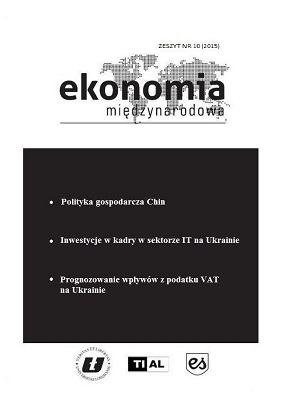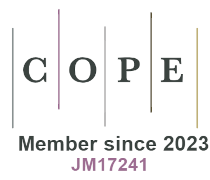Methods of forecasting VAT revenues for the state budget of Ukraine
DOI:
https://doi.org/10.18778/2082-4440.10.03Słowa kluczowe:
VAT, forecast, state budgetAbstrakt
VAT is the main indirect tax in Ukraine, among other countries, providing one of the largest items of state budget revenues. The presence of the VAT refund procedure and the need to cover public spending with the revenues from VAT administration require that an effective method of planning and forecasting VAT revenues for the new fiscal year be used. The purpose of the article was to analyze the effectiveness of two methods of forecasting of VAT revenues, such as the moving average method and the method of correlation and regression. This was done by analysing the effectiveness of forecasts made for previous years and comparing them with actual data to make the forecast of VAT revenues using these methods for 2014–2016 years and identifying the main causes of problems in the forecasting process. The results show that the forecasts based on two methods (correlation and regression analysis and double moving average) are sufficiently accurate. After making certain adjustments, these methods can be used at the national level.
Bibliografia
Aguirre, C.A. and Parthasarathi S., The Mexican value-added tax (VAT): Methodology for calculating the base, „National Tax Journal” 41(4) 1988.
Google Scholar
DOI: https://doi.org/10.1086/NTJ41788758
Azarov M.Ja. et al., Value added tax and forecasting of it revenues to the budget, Research Institute of the Ministry of Finance, Kyiv 2004.
Google Scholar
Decree of the President of Ukraine, On urgent measures to improve the efficiency of charging VAT, http://zakon4.rada.gov.ua/laws/show/671/2004
Google Scholar
Decree of the Ministry of Finance, Ministry of Economy and European Integration, State Tax Administration and State Customs Service, On approval of methods of VAT forecasting, http://sfs.gov.ua/pro-sfs-ukraini/struktura-/aparat/20-koordinatsiyno-monitoringoviy-depa/povidomlennya/byudjetno-podatkova-politik/metodikaprognozuvannya-nad/?print
Google Scholar
Jenkins G.P., Chun-Yan Kuo, A VAT revenue simulation model for tax reform in developing countries, Harvard Institute for International Development, 1995.
Google Scholar
Krusovatuj A.I., Planning and forecasting of tax revenues, Ternopil National Economic University, Ternopil 2011.
Google Scholar
Legeida N., Sologoub D., Modeling value added tax (VAT) revenues in a transition economy: Case of Ukraine, www.ier.com.ua/files/publications/WP/2003/WP22_eng.pdf
Google Scholar
Ministry of Finance, State budget (2007–2013), www.minfin.gov.ua/control/uk/publish/archive/main?cat_id=51703
Google Scholar
Olexa, M., Analysis and Econometric Modeling of the Fiscal Sector in the Slovak Republic, Institute for Advanced Studies, Vienna, Reihe Transformationsoekonomie/Transition Economics, Series No. 2 1997.
Google Scholar
Sidelnikova L., Forecasting of reserves of state budget resources growth, Economic analysis, Ternopil 2011.
Google Scholar
Treasury (2007–2013) Budget execution, http://treasury.gov.ua/main/uk/publish/category/23593
Google Scholar
Pobrania
Opublikowane
Jak cytować
Numer
Dział
Licencja

Utwór dostępny jest na licencji Creative Commons Uznanie autorstwa – Użycie niekomercyjne – Bez utworów zależnych 4.0 Międzynarodowe.









